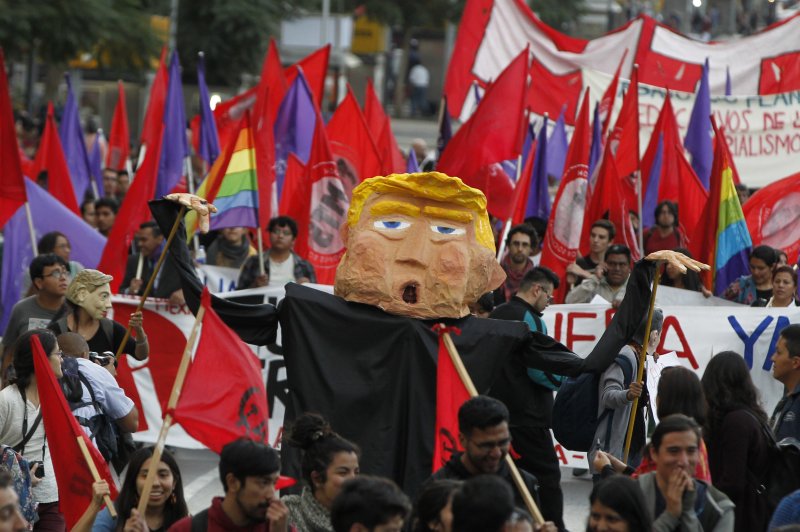A group of demonstrators protest against U.S. President Donald Trump in Mexico City on January 20, the day he formally succeeded Barack Obama in the White House. Wednesday, Mexico's foreign minister condemned the Trump administration's more aggressive immigration policy this week, which subjects more Mexican immigrants in the United States to potential deportation. File Photo by Mario Guzman/European Pressphoto Agency
Feb. 22 (UPI) -- The governments of Mexico and the United States have had some interaction since President Donald Trump took office, but the question of just how good relations are between the North American neighbors depends entirely on who you ask.
Mexico Foreign Minister Luis Videgaray on Wednesday said his government is completely opposed to this week's new immigration policy from Trump's Homeland Security Department to allow U.S. agencies to more aggressively deport "removable aliens."
The new strategy, outlined Tuesday, encourages tougher border security and stricter enforcement of immigration laws relating to undocumented migrants in the United States.
"I want to make clear, in the most emphatic way, that the government of Mexico and the Mexican people do not have to accept measures that, in a unilateral way, one government wants to impose on another," Videgary said Wednesday.
The foreign minister said the treatment of Mexican immigrants will top the agenda Thursday when Mexican President Enrique Peña Nieto meets with DHS chief John Kelly and Secretary of State Rex Tillerson.
"We are not going to accept [the policy] because we don't have to accept it and because it is not in the interests of Mexico," Videgaray added.
President Donald Trump signs an executive order at the U.S. Department of Homeland Security on January 25, which directs federal agencies to prepare for construction of a security wall along the U.S.-Mexico border -- a costly barrier Trump has repeatedly promised that Mexico will pay for. File Photo by Chip Somodevilla/UPI/Pool
The minister's comments are the latest in a verbal thrust and parry between the United States and Mexico in recent weeks. Last month, Peña Nieto renounced an executive order from Trump that directed federal agencies to prepare to build a large security wall along the U.S.-Mexico border. The ordeal prompted Peña Nieto to cancel a scheduled visit to the White House.
The two leaders mildly settled the issue in a subsequent conversation, but Wednesday's comments from Videgaray clearly indicate that a rift remains.
Trump's White House, however, doesn't appear to hold a similar view of the current state of the American-Mexican relationship.
"We have a very healthy and robust relationship with the Mexican government, and Mexican officials -- I think they would echo that same sentiment," White House spokesman Sean Spicer said during his daily news briefing Wednesday. "I think the relationship with Mexico is phenomenal right now, and I think there's an unbelievable and robust dialogue between our two nations."
Mexico City has threatened consequences if U.S. relations continue to deteriorate, such as pulling its cooperation for bilateral programs that has offered support for years.
"We have been a great ally to fight problems with migration, narcotics," Mexican Economy Minister Ildefonso Guajardo said earlier this month. "If at some point in time things become so badly managed in the relationship, the incentives for the Mexican people to keep on cooperating in things that are at the heart of [U.S.] national-security issues will be diminished."
















